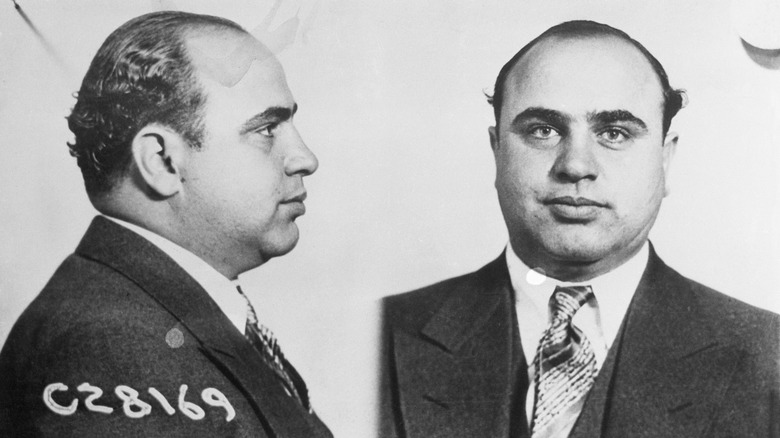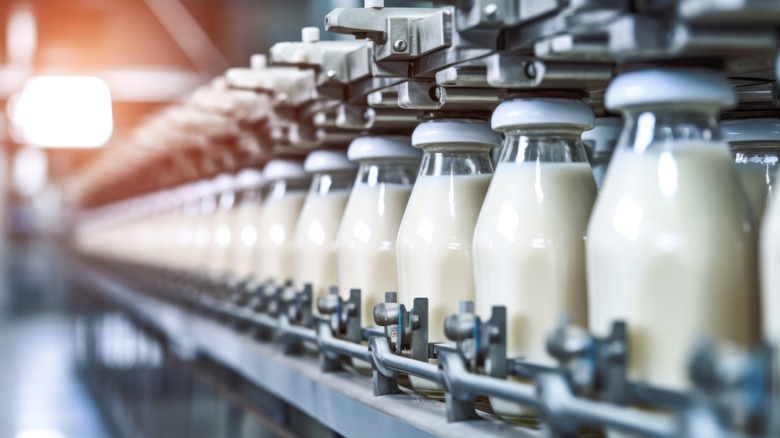Notorious Criminal Al Capone Might Be Behind Expiration Dates
Expiration dates are a staple of food safety and quality, so much so that you'd assume they're the result of caring, concerned citizens, or food scientists who wanted to improve the world. Whoever is topping your list, it's probably not Al Capone, the infamous gangster. While not as cherished as Chicago hot dogs or Chicago-style pizza, Al Capone and his gang left an indelible mark on the Windy City, and that may include expiration dates on food.
Specifically, this theory is related to milk. There's no evidence that Al Capone was writing letters to his city council or lobbying for food safety across the board, just that in the 1930s, he and his brother, Ralph "Bottles" Capone, became emboldened to tighten laws surrounding expiration dates on milk bottles.
The story has never been fully verified and there are a few versions floating around, but the through-line is the same. Either Al Capone or his brother lobbied for expiration dates to be printed on milk bottles after someone they knew got sick from drinking bad milk. Some versions say Ralph was the one who championed the cause as Al was already in jail, but some versions are steadfast that it was Scarface himself who wanted tighter regulations. Apparently, seeing someone close to them become violently ill from bad milk opened their eyes to the dangers of expired food, and they wanted more accountability and warning.
Al Capone and the milk industry
Al Capone ran the Chicago Outfit with his brother, Ralph 'Bottles" Capone, during the Prohibition era. While you may think Ralph got the nickname "Bottles" through all that bootlegging, he actually earned it through the Capones' other business venture — milk. No, really, the Capones were milkmen, in a way. One reason why people believe the Capones' involvement in milk expiration dates is that they already had a big stake in the dairy industry.
Al Capone got locked up in 1931 and kind of retired from crime — heavy on the "kind of." Prohibition was set to end soon, and the Capones needed another avenue for revenue, and maybe even something legal this time. Enter, milk. The Capones saw that this business venture was totally legal while still providing them with the opportunity to inflate prices and make a fortune in profit.
The milk industry wasn't well-regulated at the time, making it the perfect target for Capone and his mob to strongarm their way in. They bought Meadowmoor Dairies and used mob tactics to undercut the unions. The Chicago Outfit caused such a splash that their conflict with the unions came to be known as 'the Chicago Milk Wars'. After some time, the Capones were big players in the industry, so it makes sense that they didn't want something as simple as expiration dates interfering with their business.
Other theories behind expiration dates
The main evidence against the Capone theory is that expiration dates on food only really took off from the 1970s, decades after the mobsters were active. Also, there is no proof of the Capones' involvement in any government record. Still, the story remains true in the hearts of many.
Expiration dates increased in popularity after activists started printing leaflets to help consumers decipher how long different foods would last. Eventually, manufacturers and stores decided it was more authoritative for them to print best-before labels. Manufacturers used factors such as the ingredients, packaging, and temperature of the food at the time of production and distribution to determine the most accurate expiration date. Even so, according to the Food Safety and Inspection Service, most foods and drinks are safe to consume past their expiration date as the date refers to the optimal quality and taste, and not to the very last day that the product is fit for consumption.



